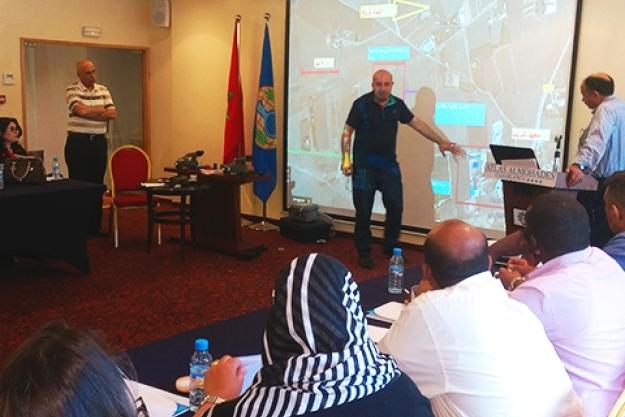
Participants during the third regional training course on Assistance and Protection against Chemical Weapons in Morocco
THE HAGUE, Netherlands — 1 June 2017 — First responders from Arabic speaking countries in the Middle East and Northern Africa upgraded their capabilities in responding to emergencies involving toxic chemicals, after a training run by the Organisation for the Prohibition of Chemical Weapons (OPCW) in Casablanca, Morocco, from 14-18 May 2017.
The third regional training course on Assistance and Protection against Chemical Weapons benefited 25 participants from various agencies involved in chemical emergency response and civil defence from Algeria, Djibouti, Iraq, Jordan, Morocco, Sudan, Saudi Arabia and Tunisia.
“In a region where the use or threat of use of chemical weapons particularly by non-State actors as well as the likelihood of chemical incidents loom ever larger, such training courses assist OPCW Member States in fortifying their chemical emergency preparedness and in establishing a professional network in the region,” stated Mr Ismail Chekkori from the Moroccan National Authority for the implementation of the Chemical Weapons Convention.
The course provided information on the types and characteristics of toxic chemicals, the use of individual protective equipment, the detection, sampling, monitoring and decontamination of toxic chemicals, and first aid in the event of chemical casualties. The training also included an exercise on how to respond to incidents with toxic chemicals.
The graduates of this basic training will progress to an advanced course that will be held in Qatar in November 2017.
Background
As the implementing body for the Chemical Weapons Convention, the OPCW oversees the global endeavour to permanently and verifiably eliminate chemical weapons. Since the Convention’s entry into force in 1997 – and with its 192 States Parties – it is the most successful disarmament treaty eliminating an entire class of weapons of mass destruction.
To date, nearly 95 per cent of all chemical weapon stockpiles declared by possessor States have been destroyed under OPCW verification. For its extensive efforts in eliminating chemical weapons, the OPCW received the 2013 Nobel Prize for Peace.
